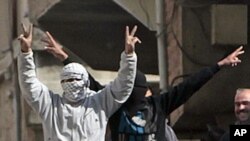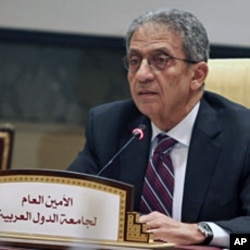Syria has rejected criticism from the Arab League about the crackdown on unrest in the member nation, and other league members are said to be at odds whether to suspend Damascus from the grouping.
Syria's envoy to the Arab League says the criticism of his country was unbalanced and shows an ignorance of what he called the "foreign plots" behind the unrest.
Arab League Secretary General Amr Moussa this week said the league was angry about the situation in Syria, but he would not confirm a report that some members were seeking to suspend Syria's membership.
"We are following the situation in Syria with a lot of concern and there are a lot of consultations, phone calls from many Arab officials on this issue, but we have not received any official request for an urgent meeting - so far," Moussa said.
Syria has reason to be wary of a suspension. In March, the league isolated Libya, then made the key recommendation for a U.N.-backed no-fly zone over the country. Though the Arab League quickly regretted the move, arguing NATO overstepped its mandate, the league remains an important regional voice in international decisions.
Yet only back in January, the 22-member group seemed to teeter on the brink of irrelevance. Headquartered just steps from Cairo's Tahrir Square - the focal point of Egypt's uprising, in spirit the league was far removed from the change demanded there. To the protesters in Egypt and across the region, the men inside the headquarter's marble halls represented exactly the stagnant, corrupt governments they rejected.
Egyptian columnist Fahmy Howeidi says a key to the disconnect can be seen in the group's official name - the League of Arab States, with no claim to represent the Arab people, especially those rising up in protest.
"They didn't talk about what happened in Bahrain. So you can imagine as long as the Arab League is representing the Arab governments and the Arab leaders, they will deal with all changes in the area in a very cautious way and indirect messages either positive or negative," said Howeidi.
That hesitancy has opened the door for potential rivals. The Gulf Cooperation Council has been active in league-member Yemen, mediating a still-unsigned transition deal between the opposition and the government.
Mounzer Sleiman is the director of the Washington-based Center for American and Arab Studies.
"There is a sign that maybe the GCC countries could expand their influence to be a kind of unofficial replacement of the Arab League and they will control the Arab official position," Sleiman said. "Of course, Saudi Arabia would like to play, utilizing its 'money influence' because they do not have political influence or military power to project in the region."
Syria offers a particular challenge for the Gulf-based GCC, and indeed for the Arab League. The country has a strong backer in Iran, rare among members of both alliances. Sleiman believes some figures in Saudi Arabia would like to see the current Syrian government not removed but weakened to a point it would seek help from the GCC, and in particular Riyadh.
That's a scenario that could further undermine the Arab League. But Secretary General Moussa is upbeat about the group and the region's future.
"We are doing a lot. We are in the midst of those events and we believe and I believe that the change will be the order of the day," Moussa said. "This region and the Arab world is undergoing a major movement towards the future and the item is change, modernization. There will be no U turns on this."
He may have a rosier perspective than others in the group. He is leaving his post soon, and plans to run for president of Egypt - along with Tunisia the only countries to have fulfilled the immediate promise of the Arab Spring.





